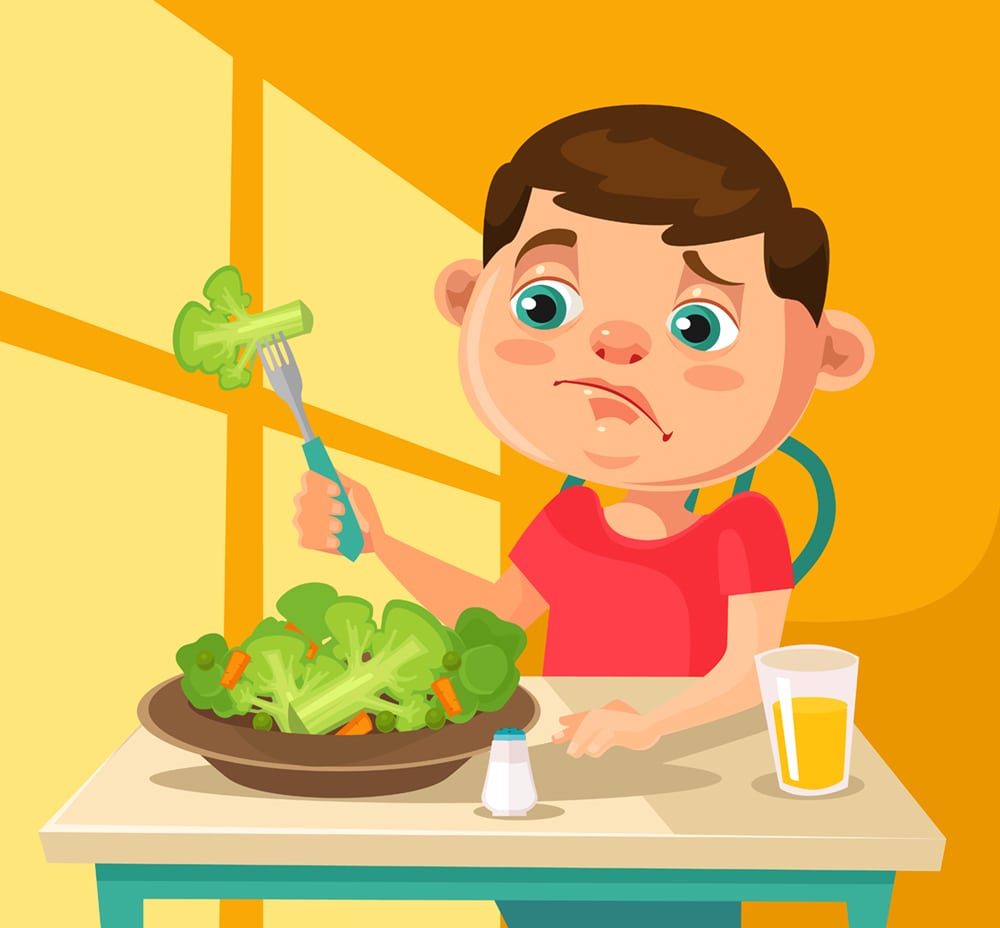Table of Contents
 We all want to make sure that our children are getting the nutrition they need, but sometimes our little ones just won’t cooperate. In most cases, there’s no cause for concern. Picky eating in young children is usually temporary and can be resolved with consistency and creativity from parents. But sometimes, picky eating can be a sign of something more serious and families may need a little more help from their pediatrician.
We all want to make sure that our children are getting the nutrition they need, but sometimes our little ones just won’t cooperate. In most cases, there’s no cause for concern. Picky eating in young children is usually temporary and can be resolved with consistency and creativity from parents. But sometimes, picky eating can be a sign of something more serious and families may need a little more help from their pediatrician.
My Child Is A Picky Eater: What Can I Do?
Picky eating in toddlers is often a developmental phase as young children experiment with boundaries and self determination. We’ve found some great tips from the National Institutes of Health, the American Academy of Pediatrics’ parent website www.healthychildren.org, and other organizations for turning things around for picky eaters. Our experienced team of pediatricians and nurse practitioners has a terrific toolbox for helping parents develop great strategies for expanding their children’s dietary horizons.
How Can I Get My Picky Eater To Try New Foods?
There are tons of great strategies for growing adventurous eaters. Your pediatrician can help you come up with a plan, but here are a few tried and true tips:
- Be a nutrition role model: Both the AAP and NIH, along with our own staff, consistently emphasize that setting a good example and eating as a family are some of the most important components in raising adventurous eaters. Share meals as a family as frequently as possible and make sure your child sees you making healthy choices. Even if he’s not ready to try something right away, just watching his parents eat a wide range of nutritious foods sets a great example and will pay off in the long term.
- Pick your battles: Don’t let your child’s food choice become a source of stress and contention. If you offer a new food and your child declines, don’t force the issue. Let it go temporarily and come back to it another time. The idea is to remind children that healthy eating is enjoyable and not a chore!
- Get creative: There are so many ways to make healthy foods appealing and enjoyable. It may take a little extra work, but it almost always pays off. Make food fun by displaying healthy foods in creative ways, using bite sized portions, offering veggie dips, or building your own dinners with healthy ingredients. Focus on bright colors and attractive presentations or try delicious smoothies combining fruits and vegetables.
- Change it up: Try serving healthy foods in different ways. For example, vegetables can be served raw or cooked in a range of ways. Sometimes texture and crunch are everything, so if your little one likes raw green beans, go for it!
- Keep trying: One of the golden rules for growing adventurous eaters is to keep offering healthy foods in a non-confrontational way. Taste buds change and there’s often a light bulb moment after a period of rejection. Keep eating healthy and offering your children the healthy foods you love.
- Get your children involved: Both the AAP and the NIH stress that getting children involved in meal planning and preparation is key to helping cultivate healthy eating habits. Let them help choose healthy items, wash and chop vegetables and cook with supervision. If you have access to a garden or community garden, letting kids help grow fruits and vegetables is a great way to generate enthusiasm!
- Use what works: The AAP suggests using healthy foods your child enjoys as a bridge to foods with similar flavor profiles. Use your successes to create new opportunities. You can also combine foods your child loves with new foods to take some of the uncertainty out of the equation, like the old standard of combining broccoli with melted cheese to introduce that wonderful green veggie to young kids.
- Limit junk food: Have lots of healthy choices available and limit junk foods accessible in the home. Make it easy for young children to grab healthy snacks from the fridge or pantry. The AAP also suggests avoiding bribing your children with treats. While it’s tempting to offer ice cream as a reward for eating spinach, we want children to experience the joys and deliciousness of healthy eating on its own.
Should I Give My Picky Eater Vitamin Supplements?
Vitamin supplements can certainly help. But remember, they’re designed to supplement a healthy diet, and vitamins aren’t a substitute for building healthy habits. Talk to your pediatrician about choosing vitamin supplements to make sure they’re age-appropriate, in line with your nutritional goals and your child’s needs.
Could My Child’s Picky Eating Be A Sign Of Something More Serious?
A recent AAP study shows that in some cases, selective eating can be a sign of other issues including anxiety, depression and ADHD. Picky eating can also manifest in children on the autism spectrum. If you’re concerned that your child’s eating habits go beyond a typical developmental phase, talk with your doctor about getting further evaluations.
Picky Eating: Keep Calm And Build Great Habits!
Chances are your little one will grow out of her picky eating phase. It just takes some patience, helpful strategies and support from your pediatrician. Remember, your goal isn’t just to get your kiddo to eat her peas but to create great habits that last a lifetime. The minor setbacks and refusals won’t matter in the long run as long as you keep setting a great example and gently and consistently expose her to the good stuff!







